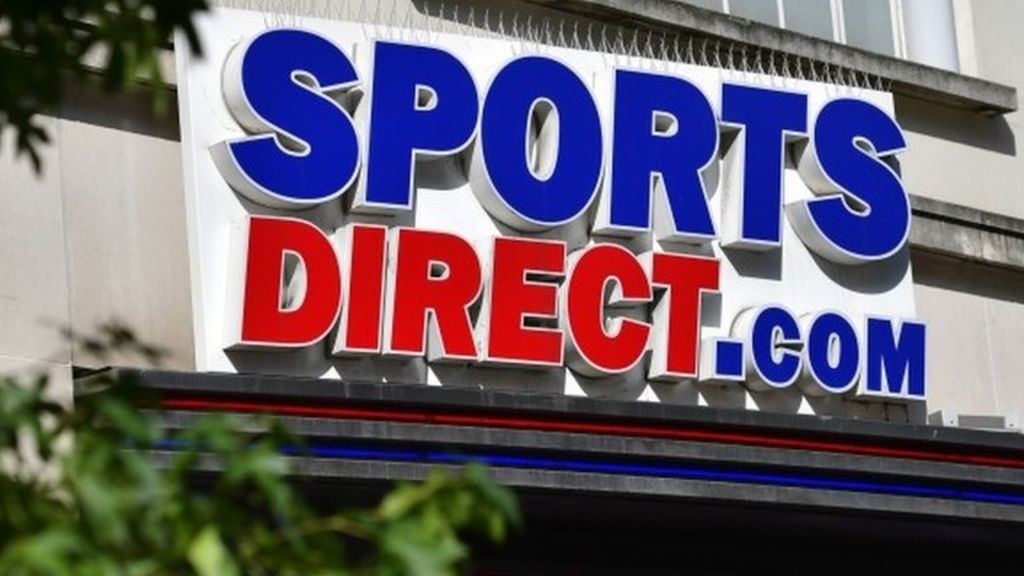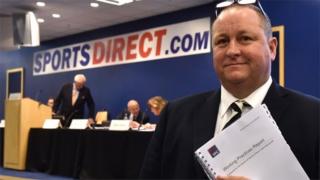Sports Direct: Ashley steps in as chief executive resigns – BBC News

 Image copyright PA
Image copyright PA The founder and majority owner of Sports Direct, Mike Ashley, has stepped in as chief executive after the surprise resignation of Dave Forsey.
The retailer has been under fire over zero hours contracts and disclosure that staff at a warehouse were paid less than the minimum wage.
Independent shareholders had called for changes to the way the company was run.
Sources told the BBC that Mr Forsey was “not coerced”, and that Mr Ashley is a permanent replacement, not temporary.
The billionaire businessman has given up his role as executive deputy chairman.
BBC business correspondent Joe Lynam said sources told him that the shake-up was not part of a plan to take Sports Direct private.
There has been speculation that, following months of criticism of the company, Mr Ashley wanted to remove Sports Direct from the stock market.
‘Amazing opportunities’
Mr Ashley, who owns more than 50% of the company, said in a statement: “I feel like I have lost my right arm, but I do hope to have the opportunity to work with Dave again in the future.”
Mr Forsey has worked for the retailer for 32 years after starting as a part-time worker when he was 18.
Earlier this year he agreed to forgo a 3.7m share award in recognition of the problems at the company.
Mr Forsey said: “I have given my entire working life to the company and in return the company has given me amazing opportunities and experiences.”
Sports Direct’s board made two other changes, promoting Karen Byers to the role of global head of operations, and Sean Nevitt to the role of global head of commercial.
Amid criticism over Sports Direct’s working practices and bad publicity, there had been calls by shareholders for the removal of chairman Keith Hellawell.
‘Workhouse’
The company, which has around 450 retail outlets, came under the spotlight after an investigation uncovered that staff were kept on site at its giant Shirebrook warehouse in Derbyshire after their shifts for body searches.
 Image copyright PA
Image copyright PA These took so long that their pay effectively dipped below the minimum wage.
Mr Ashley, Sports Direct’s billionaire founder, was called to answer questions from MPs, who compared working practices at the warehouse with “that of a Victorian workhouse than that of a modern High Street retailer”.
In the wake of that, the sportswear chain’s lawyers produced a critical report of its working conditions.
The company was criticised for its use of zero hours contracts. It says it will offer workers who want them guaranteed hours. It also said it would put a worker on the board.
That report also criticised Mr Forsey for failing to inform the Sports Direct board about some of the issues at Shirebrook.
But calls for an independent review continued and earlier this week, Sports Direct said it would authorise such a study of working practices and corporate governance, following concerns raised by shareholders.
Mr Ashley denied knowing much about the way Shirebrook operated, telling the BBC: “You’d be surprised how little I knew of what was going on.”

Who is Sports Direct’s Karen Byers?
Like so many in the company’s hierarchy, Karen Byers, Sports Direct’s new global head of operations met founder Mike Ashley informally and has known him a very long time.
She’s been with the company for more than 20 years and it is said she got the job after trying to sell Mike Ashley a pair of jeans. Despite being head of retail at a publicly-listed retail giant with 30,000 employees for much at that time, she’s very low profile indeed.
Earlier this year Mike Ashley himself singled her out in a rare interview he gave to the Times newspaper: “Karen Byers runs Sports Direct. She runs the retail, all the money comes out the retail, [the warehouse workers and store managers] are her army. She is the person who sets the rules. Not me.”
One investment analyst firm said she was well regarded inside the company and out. The same firm though said she was not known for her “flowery or evasive approach”. Just like her boss.
‘Bad capitalism’
Paul Blomfield, a member of the Business Innovation and Skills committee which grilled Mike Ashley in June, is not convinced by the changes: “What our committee wanted to happen was for the company to seriously address what was, not just problems around the edges, but systemic labour exploitation in the workplace. And whether Mr Ashley is the person to do that – given the evidence he gave to our committee – is yet to be seen.”
Mike Fox, from shareholder Royal London Asset Management, wasn’t impressed with Friday’s board changes either: “The installation of Mike Ashley as chief executive, consolidating his influence at the top of the business, is unlikely to reassure anyone.”
He said the way the company was run had long been a problem and that Sports Direct still needed a new chairman before it could rebuild trust with investors.
Sarah Wilson, chief executive of shareholder pressure group, Manifest, told BBC Radio 5 live the move added another corporate governance problem: “Are we going to see [Mike Ashley] step down from his other job as deputy chairman?
“Had Mike Ashley listened to shareholders four or five years ago, we might not be in the situation we’re in at the moment.”
She said the company’s actions were not just damaging to shareholders but “undermined the general public’s perception of capitalism – full stop”.